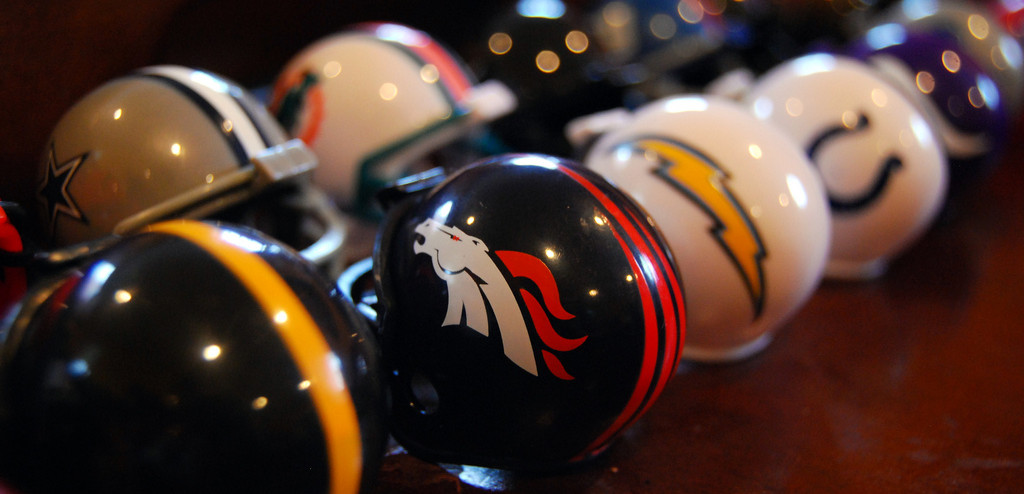Papa John’s vs the NFL – a slice of controversy
Fifteen months ago, NFL quarterback Colin Kaepernick choose to kneel for the US national anthem in a protest against black oppression and police brutality. What followed has been one of the most polarising cultural battles in American history.
As always, culture only gets so far before money intervenes. Papa John’s, one of the NFL’s biggest sponsors, have voiced their displeasure with the situation, thus triggering some interesting questions about the role of sponsors in this fight.
Only 46% of American voters view the NFL positively, as opposed to 41% who view it negatively…
Player protests have undoubtedly had a serious impact on the NFL, with its ratings and popularity dropping considerably. Only 46% of American voters view the NFL positively, as opposed to 41% who view it negatively. Four years ago, the numbers were 64% and 19% respectively. This drop has almost entirely been down to Republican voters (statistically, the largest chunk of NFL viewers by a long way), with support dropping 37%. Although the sport remains the most watched in America, the average game is a million viewers down on the same point last year.
Cue Papa John’s CEO John Schnatter. He said that the NFL’s inability to deal with the situation has hurt his own business, adding that he was ‘disappointed the NFL and its leadership did not resolve this.’ He said that the dispute should have been ‘nipped in the bud’ when it first started, and that the NFL controversy was both ‘polarising the customer and polarising the country.’
Budweiser took a real hit, retaining only a 9% positivity rating among NFL fans by the end of September 2017…
In response to the protests, many of the NFL’s biggest sponsors issued statements agreeing with both the players’ rights to protest and their respect for the American flag – in effect, they took a middle ground to minimise damage on either side. Budweiser took a real hit, retaining only a 9% positivity rating among NFL fans by the end of September 2017. Under Armour, Hyundai and Ford, all major NFL sponsors, have also seen significant drops, but Schnatter’s intervention is the first time a company – the league’s most recognised sponsor – has connected their misfortune to the NFL itself.
The issues are twofold. Firstly, Papa John’s pays for its adverts to appear during games – if fewer people are watching games, the value of that inevitably advertising drops. Secondly, the company see their number of orders pick up during games – again, if fewer people are watching, that hits the likelihood of them ordering a takeaway.
After the company released its third-quarter financial report, investors reacted, causing shares to drop 11% and reducing Schnatter’s net worth by $70 million in a single afternoon…
After the company released its third-quarter financial report, investors reacted, causing shares to drop 11% and reducing Schnatter’s net worth by $70 million in a single afternoon. The business had beaten estimates on earnings and revenue, but lowered its estimates for same-store sales for the next quarter (which handily coincides with the football season in America) and cut its profit forecast for the year.
Now, the issue is not nearly as cut and dry as ‘bad sponsee, the sponsor suffers’ – other pizza chains were quick to criticise Papa John’s and state that their sales were doing fine. DiGiorno Pizza tweeted ‘Better Pizza. Better Sales,’ leading to a huge Twitter war between the two companies, and Pizza Hut took the less provocative tack of issuing a statement stating their sales had seen little to no change as a result of the controversy, and that they had actually seen an upturn in pizza sales during live sporting events (primarily basketball, of which the company is a sponsor).
Papa John’s may have also been too dependent on TV advertising at a time when, on average, more Americans are forsaking the television in order to spend time online…
So why have sales dropped for Papa John’s? The NFL sponsorship and the quality of its food may help explain this, but there are other plausible reasons. Other, smaller fast-food companies have started to deliver, affecting pizza sales, and more people are also cooking at home. Papa John’s may have also been too dependent on TV advertising at a time when, on average, more Americans are forsaking the television in order to spend time online.
If Schnatter was worried about the NFL association hitting his business, the latest development will be even less welcome: in order to help Papa John’s out with its sales, the alt-right has encouraged its acolytes to buy pizza there. In response, Schnatter has had to issue public statements ordering white supremacists not to order from his restaurants, and condemning all hate groups. One public relations problem is shifting into a considerably worse one.
The protest controversy is showing no signs of resolution and, if one is to come quickly, I imagine it will be the economics that force the NFL’s hand. If other companies start to suffer because of their relationship with the league, money will soon start to talk. I suspect Papa John’s will not be the only business to start getting vocal about the NFL.

Comments